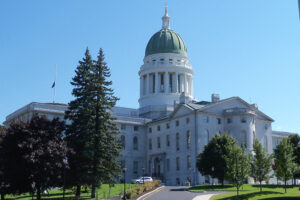Cathy Breen • May 2025
It’s hard to believe, but we’re quickly approaching the end of this year’s legislative session. From testifying at public hearings that last late into the evening, to presenting your petition signatures and messages to lawmakers, to building support for our shared priorities with legislators on both sides of the aisle, the MCV team and our allies have been showing up in force to push forward policies that will help build a just, thriving future for all in Maine.
As we enter this final stretch, we wanted to take a moment to provide you with some updates on our priority bills and say THANK YOU for all your help and support and for answering our many calls to action over these last months!
Here’s our update from the State House. Stay tuned for more updates in the next few weeks on how you can help us get these bills across the finish line:
Climate & Clean Energy
A Maine Climate Superfund | LD 1870

While LD 1 sets Maine on the path to improved resiliency from the impacts of extreme weather and climate change, further investment is needed and Maine taxpayers should not be on the hook for a problem they did not cause.
That is why the Maine Climate Superfund Act aims to hold the largest fossil fuel companies accountable for the climate crisis and get them to pay their fair share toward Maine’s recovery and resilience. Payments from large oil and gas corporations will finance projects that protect Maine people and businesses from the devastating impacts of the extreme weather fueled by climate change.
LEARN MORE: Read the EPC factsheet on the Maine Climate Superfund Act.
Increasing Storm Preparedness | LD 1

We have all seen and experienced the impacts of extreme weather fueled by climate change. The winter storms of 2023-2024 wrought destruction across our state, causing weeks-long power outages, devastating flooding, and hundreds of millions of dollars in damages to homes, businesses, and public infrastructure. This bipartisan bill uses special, one-time funding to improve how communities, homeowners, businesses, and emergency responders prepare for and respond to severe storms.
LEARN MORE: Read the press release from the Governor’s Office on the passage of LD 1.
Achieving 100% Clean Electricity by 2040 | LD 1868
LD 1868
Getting off of dirty fossil fuels is the only solution to the climate crisis and will deliver a host of economic and public health benefits to Maine: lowering energy costs, creating jobs, and protecting people from harmful pollutants and emissions.
LEARN MORE: Read the EPC factsheet for more information.
Energy Fairness for all Mainers | LD 1949
LD 1949
As we look to get off fossil fuels and electrify our energy grid, it’s critical that accessibility and consumer protections are top priorities. The Energy Fairness Act, LD 1949, puts Maine people before the profits of utility companies to make clean electricity accessible and affordable for everyone in our state. It will establish disconnection protections for older Mainers and vulnerable people with disabilities, ensure proceedings before the Public Utilities Commission are more just, and require new transparency and accountability standards for utilities.
LEARN MORE: You can learn more about the Energy Fairness Act in the EPC factsheet.
Democracy & Equity
Expanding Ranked Choice Voting | LD 1666
The Veterans and Legal Affairs committee advanced LD 1666 to the House and Senate! We’re keeping up the pressure to make sure the bill passes the full legislature and stands up to review from the courts.
We have a pivotal gubernatorial election next year and the potential for a crowded field of candidates. So, it’s imperative that we make our elections as fair and meaningful as possible for Maine voters. This bill would do just that, expanding highly popular Ranked Choice Voting (RCV) to gubernatorial and state legislative races. RCV leads to more representative outcomes and frees voters from worrying about how others are going to vote.
LEARN MORE: Read the full bill text here.
Wabanaki Sovereignty | LD 785 & LD 385

LD 785 & LD 385 would direct the state to adopt all recommendations from the bipartisan task force and honor the Wabanaki Nations status as federally recognized tribes. The bill will be heard by the Committee on Judiciary during the second half of the legislative session that starts in January 2026.
LEARN MORE: Read the EPC factsheet on Wabanaki Sovereignty.
Environment
Land for Maine’s Future | LD 362

With federal pressure to privatize and sell off public lands, it is more important than ever that Maine protect the places that define the unique environmental character of our beloved state. LD 362 seeks to secure $50 million for LMF, a crucial investment in an iconic program
LEARN MORE: Read the EPC factsheet to understand the importance of the LMF program.
Protecting Maine from toxic PFAS | LD 222

PFAS-laden firefighting foam is still being stored at sites in Maine and around the country, creating the potential for another spill and for it to leech into our soil and groundwater. LD 222 would provide communities with the funds and resources they need to safely collect and remove this toxic firefighting foam, protecting Maine people and the environment from its permanent and harmful effects.
LEARN MORE: Read the EPC factsheet for more information.

